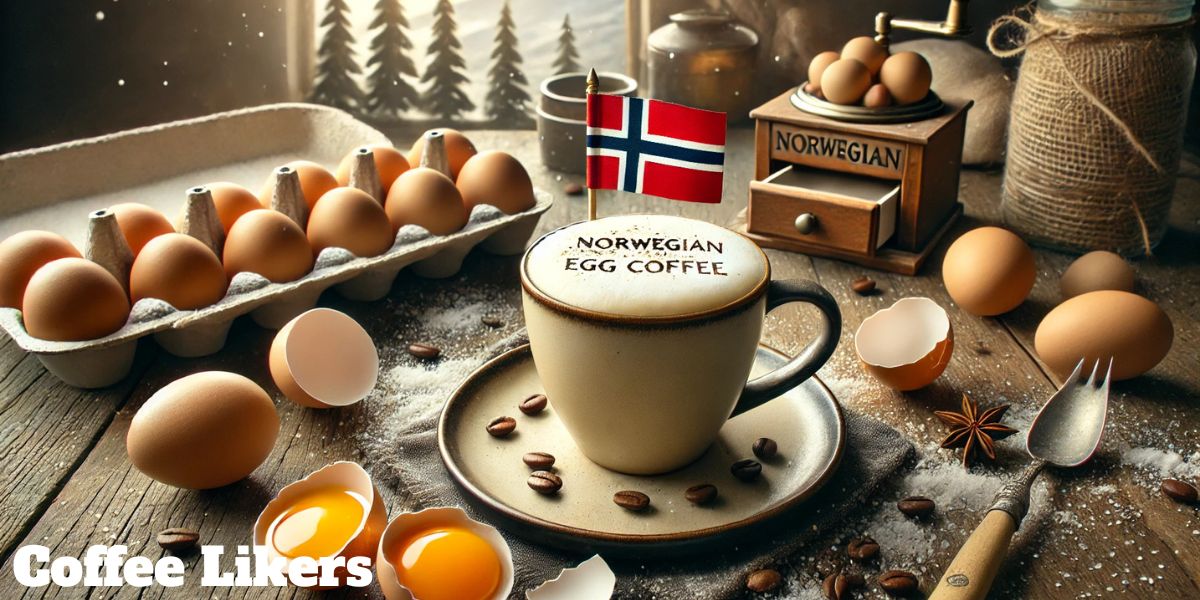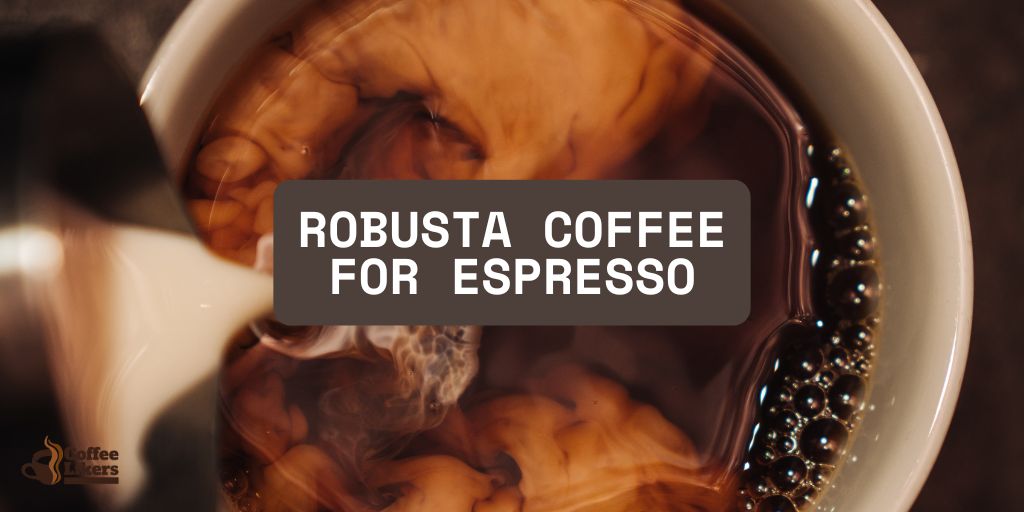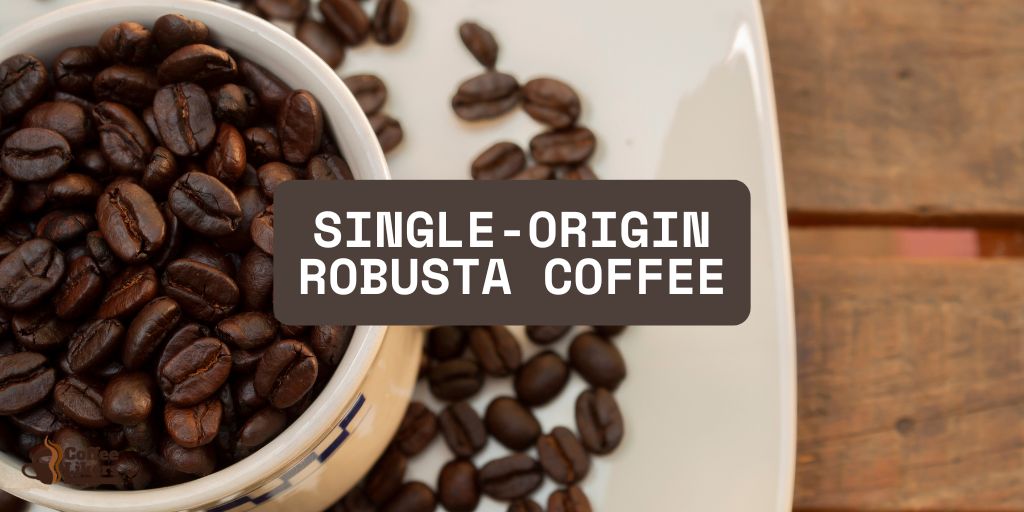Norwegian egg coffee is a special way to make coffee. It is not like regular brewing methods. This unique method involves mixing a raw egg with coffee grounds before brewing.
The result is a smooth and rich cup of coffee that is less bitter than usual. Some may think adding an egg is strange, but this traditional method from Norway has been enjoyed for its unique taste and caffeine kick.
What is Norwegian egg coffee and how is it made? Norwegian egg coffee is a unique way to make coffee. You mix a whole raw egg with coffee grounds and brew it with hot water. Then, add a bit of cold water to help the grounds settle before serving. This method results in a smooth and rich cup of coffee.
Norwegian Egg Coffee: Brief Description
Norwegian egg coffee is different because it uses a raw egg in brewing. This might seem strange, but the egg helps create a smooth and flavorful coffee.
To make it, you mix ground coffee with a whole egg, sometimes even with the shell. Then, you brew this mixture with boiling water. The egg helps bring the coffee grounds together, making separating from the brewed coffee easier.
This method gives you a clear cup of coffee with less bitterness and acidity. The egg yolk also adds to the rich texture, making the coffee feel velvety smooth. Many people enjoy this unique way of making coffee.

Eggs And Coffee
The use of a raw egg in Norwegian egg coffee might seem strange, but it has a clear purpose: it makes the coffee less bitter and acidic.
The egg white has proteins that connect with the bitter parts of coffee. This helps to remove those bitter tastes while brewing.
Also, crushing the eggshells and adding them can help. The eggshell gives calcium carbonate, which works like a natural antacid. Coffee’s acidity is reduced by it.
As a result, you get a smooth and gentle cup of coffee that even people who
usually think coffee is too bitter or acidic can enjoy. This special mix of ingredients shows the cleverness of traditional Norwegian brewing methods. It turns a basic cup of coffee into a more pleasant drinking experience.
Whole Egg Coffee
The special thing about Norwegian egg coffee is how it is made. Even though a French press is not the traditional method, it can still give you the same great result.
To make it, you mix coarse coffee grounds with a whole egg, and sometimes you can also add crushed eggshells. Then, you let this mixture sit in boiling water. This helps the egg cook and the coffee flavor mix in.
A crucial step is to add a little cold water at the end. This helps the coffee grounds, which are now mixed with the cooked egg, settle at the bottom. Then, the French Press’s filter separates the brewed coffee from the grounds. Finally, you have a clear and delicious cup of coffee.
Swedish Egg Coffee
The tradition of egg coffee is not only in Norway; it is also a beloved part of Swedish culture.
In some Swedish-American communities, it is known as “church basement coffee.” This way of making coffee brings people together and showcases their shared history.
You can find a traditional Swedish egg coffee recipe on The Spruce Eats.
This recipe demonstrates how significant this special drink is to the culture. It has been handed down through generations

and provides a simple method to create a smooth and delicious cup of coffee. Whether it is prepared in a bustling Swedish kitchen or enjoyed at a church gathering.
Swedish egg coffee illustrates how a simple beverage can unite people across borders and generations, becoming a symbol of their cultural identity and tradition.
Norwegian Coffee Brands
While we do not know exactly where Norwegian egg coffee came from, Norway has a strong coffee culture. People in Norway drink a lot of cups of coffee every day. They rank high in coffee consumption worldwide.
Norwegian coffee brands provide many choices, from light and bright roasts to deep and chocolatey flavors. These brands care about where they get their coffee from. They focus on being ethical and protecting the environment and coffee-growing communities.
Whether you choose a classic Norwegian coffee brand or try to make egg coffee at home, one thing is clear. Coffee is important in Norwegian culture. It shows warmth, connection, and a daily routine.

Authentic Egg Coffee Recipe
To make a traditional cup of Norwegian egg coffee, you only need a few things: coarsely ground coffee, a fresh egg, and boiling water. The steps are simple, but it’s important to pay attention to the details.
Start by mixing one tablespoon of ground coffee for each cup with a whole egg in a small bowl. To reduce acidity, some people also add crushed eggshells.
Pour boiling water into the bowl, making sure the egg and coffee grounds are completely covered. Take a few minutes to let the coffee sit.
Then, gently stir to help the grounds settle at the bottom of the pot. Finally, pour the brewed coffee into a cup, leaving any leftover sediment behind.

History And Origins Of Norwegian Egg Coffee
The exact beginnings of Norwegian egg coffee are unclear.
There are no clear historical records to show when it first appeared.
Still, food historians think this special way of brewing coffee came from needing to make do with what they had.
In the past, good coffee filters were hard to find, especially in rural areas. So, clever Norwegians might have found that eggs could help remove coffee grounds. This made the coffee clearer and better tasting.
As the years went by, this method became a beloved tradition. It showed how resourceful people could be and showed their love for a simple cup of coffee.
This tradition also moved with Scandinavian immigrants to the American Midwest. It is still seen in some communities today, often during church gatherings and social events.
The Traditional Recipe For Making Norwegian Egg Coffee
The charm of Norwegian egg coffee is its simple nature. The classic recipe needs just a few ingredients: coarsely ground coffee, fresh eggs, and water.
The process is easy too. It aims to get the best flavor while keeping the bitterness low.

Start by cracking one egg for each cup of coffee you want. Place the eggs in a bowl, and don’t forget to add the eggshells with coffee. Mix in your coffee grounds until it looks like a thick paste.
Then, pour boiling water over your mixture. Let it steep for a few minutes as the egg cooks and the coffee infuses. The egg yolk adds a smooth richness to the drink.
Next, add a small amount of cold water. The coffee grounds will settle at the bottom as a result. You can use a French press or pour carefully to leave the sediment behind.

The Unique Ingredients And Preparation Method Involved In Making Norwegian Egg Coffee
Norwegian Egg Coffee has some special steps that might seem hard, but they make it good. First, you need coarsely ground coffee. This is important because it stops the coffee from tasting muddy. The next unique part is mixing a whole egg, shell, and all, with the grounds.
This strange step has a good reason. Boiling water is poured over this mix. The egg helps to stick together the tiny coffee grounds. After steeping, you add a cup of cold water.
This cools it down a bit and helps the grounds sink to the bottom. You will then have a clear, clean coffee with no sediment.
It takes a bit more effort than a regular cup of coffee, but the taste is much smoother and less bitter. Some people even think it is sweet enough to skip the sweetened condensed milk.

Benefits Of Using Eggs In Coffee
Adding an egg to coffee may seem strange for its health benefits, but it increases the taste.
The egg white helps make the drink clearer by binding to the tannins in coffee that make it bitter.
The egg yolk adds fat, giving the coffee a rich and creamy texture that feels good in your mouth. While the egg does provide a bit of protein and calories, it doesn’t change your diet much.
It’s like a cooking hack that makes your coffee smoother, less bitter, and more enjoyable. This method shows how traditional brewing techniques are becoming popular again in modern coffee culture.
Tips For Achieving The Perfect Blend And Consistency
To make great Norwegian egg coffee, keep these key things in mind. Start with coarse coffee grounds, similar to what you’d use for a French press.
Using finer grinds, like for espresso, can result in a murky brew.
Before adding the egg to the coffee grounds and boiling it in water, mix them

thoroughly. This ensures the egg blends well with the grounds, making it easier to separate them later. Lastly, have patience during the settling process! After adding the cold water, allow the grounds to settle at the bottom. Waiting will give you a clear, sediment-free cup of coffee.
How To Properly Mix The Egg With Ground Coffee And Water For A Smooth Blend?
The key to making the perfect Norwegian Egg Coffee is in how you mix the egg, coffee, and water. This method is different from Vietnamese egg coffee, which uses egg yolk and condensed milk. Here, we use the whole egg to make the drink clearer.
To start, put cold water and coarsely ground coffee in a pot. Crack the egg in, shell and all! The crucial part is how you mix it. Don’t just stir lightly; whisk it hard.
You want to mix the egg well, breaking up the whites so they cover every piece of coffee. It might take some effort, but this careful blending will give you a smooth cup of coffee without any residue.

Flavor Profile Of Norwegian Egg Coffee
Norwegian egg coffee might seem strange, but it tastes really good. It’s super smooth and the egg acts like a filter, getting rid of any bitterness or sharpness in the coffee. This leaves a nice, clean flavor.
The smell is lovely and reminds you of roasted coffee beans. There’s a hint of earthiness, but it’s not overpowering. The egg doesn’t add much flavor, but it does make the coffee feel thicker. It’s like adding a little bit of dairy, but it doesn’t change the coffee’s real taste.
The Texture Of Norwegian Egg Coffee Compared To Traditional Coffee
One of the best things about Norwegian egg coffee is its special texture. It is very different from regular coffee, which can be thin and watery. The egg, especially the yolk, helps mix with the coffee oils. This makes the drink rich and creamy in your mouth.
Think about sipping a smooth espresso. It feels soft and leaves a nice taste. That’s the kind of enjoyable experience you get with Norwegian egg coffee. No paper filters are used, which makes the coffee even smoother.
The oils from the beans really stand out. This mix of texture and taste makes Norwegian egg coffee feel like a special treat. It turns a simple cup of coffee into something truly special.
Health Considerations When Consuming Raw Eggs In Coffee
Using a raw egg in Norwegian egg coffee may raise some concerns about food safety. The main worry is the risk of Salmonella. However, boiling water used during brewing reduces this risk significantly.
It’s important to know that boiling doesn’t eliminate the risk of Salmonella. But the chances of getting sick are very low, especially when using fresh, well-refrigerated eggs. If you’re still worried, you can use pasteurized eggs.
These eggs go through a heat process that kills harmful bacteria. Ultimately, whether you choose to enjoy Norwegian egg coffee is your personal decision based on your comfort level and the risk.
Variations And Modern Twists On The Traditional Recipe
The classic recipe for Norwegian egg coffee is loved for being simple. However, today’s coffee lovers are adding fun twists to make it taste even better and suit different tastes.
Some new ideas include using spices like cinnamon or cardamom while brewing. This makes the coffee warm and aromatic.
Others are trying different coffee beans, like single-origin or darker, chocolatey blends. If you want some sweetness, adding honey or maple syrup goes well with the rich flavor of the coffee.
Exploring Other Creative Ways To Enhance Your Coffee Experience
There are many ways to make your coffee routine even better besides Norwegian egg coffee. One simple way to add more flavor is by trying spices like cinnamon, nutmeg, or chili powder with your coffee grounds before brewing. This can give your coffee a cozy and surprising taste.
It is also possible to experiment with different types of milk. Oat milk is sweet and creamy, perfect for medium-roast coffees. Darker roasts pair well with almond milk’s subtle nutty flavor.

Serving Suggestions And Accompaniments For Norwegian Egg Coffee
Norwegian Egg Coffee has a strong taste and smooth texture. It is delicious on its own and goes well with many snacks. People often choose simple treats like light sponge cakes or crumbled cookies. Their mild sweetness helps balance the rich flavor of the coffee.
For a special touch, try serving it with slices of a heavy, fruit-filled Norwegian cake such as ‘Kvæfjordkake.’ The layers of meringue, vanilla cream, and almonds go well with the subtle flavors of the coffee.
Whether you enjoy it for breakfast or as an afternoon pick-me-up, having the right snack can enhance your experience with Norwegian Egg Coffee.
Cultural Significance Of Norwegian Egg Coffee In Norway
Norwegian egg coffee isn’t as popular as before, but it’s still culturally important. It shows creativity and a love for coffee. This recipe has been passed down for many years, bringing back memories of simpler times when families used what they had to make tasty drinks.
Today, even though modern brewing methods are more popular, egg coffee still appears at celebrations and special events. It represents warmth, good hospitality, and shared culture.
Its continued use in Norwegian homes shows how strong culinary traditions can be, connecting the past and present through a unique and flavorful cup of coffee.
FAQ About Norwegian Egg Coffee
What Is The Point Of Egg Coffee?
In egg coffee, the egg helps filter out bitterness and sediment. This makes the coffee smoother and richer in taste. It not only improves the flavor but also connects to traditional brewing methods. This adds a bit of history to your coffee routine.
Does Egg Coffee Have Raw Egg?
Yes, traditional egg coffee includes putting a raw egg, still in its shell, into the coffee grounds. However, the boiling water that is used while brewing helps cook the egg, which lessens health worries. If you’re still unsure, you can use pasteurized eggs as a safer choice.
What Is Norwegian Coffee?
Norwegian coffee is known for its strong taste and high caffeine level. People often like light roasts because they show off the flavors of the bean’s origin. Not every coffee made in Norway contains eggs, but the brewing methods are important. They show the country’s rich coffee culture.
What Country Has Egg Coffee?
Egg coffee is often linked to Norway, but it is much more than that. Sweden has its own type of Swedish coffee called “church basement coffee.” In Vietnam, they make “cà phê trứng,” which mixes egg yolk with condensed milk for a sweet flavor. This shows that egg coffee is loved all over the world.
Final Thought
Norwegian egg coffee is famous for its unique way of making and delicious taste. It lets you explore Norway’s food customs. It’s not just a beverage to wake you up.
It’s also a chance to see how clever people were in the past. They enjoyed simple pleasures with basic ingredients.
Whether you are interested or want to try something new, Norwegian egg coffee is a fun experience for your taste buds.





Leave a Reply